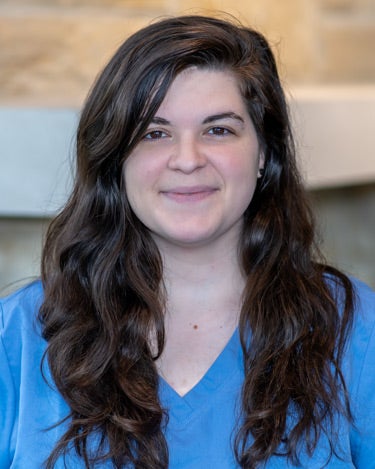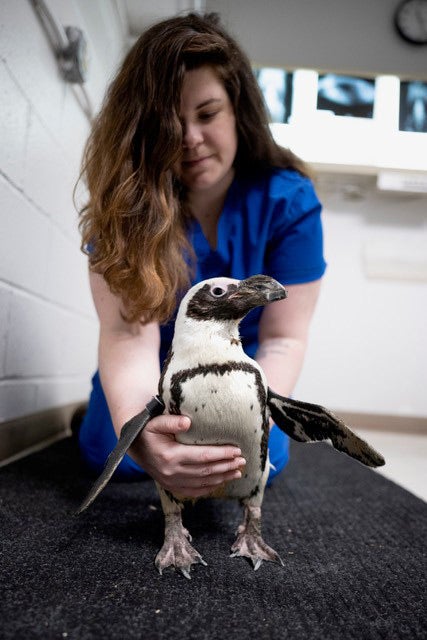From Stage Manager to Avian Advocate: Jess Lindberg’s Journey from the Dietrich School to the National Aviary
 Jess Lindberg honed her interests through diverse coursework and hands-on experiences to land a fulfilling career at the National Aviary.
Jess Lindberg honed her interests through diverse coursework and hands-on experiences to land a fulfilling career at the National Aviary.
Born and raised in Johnstown, PA, Lindberg’s career path was not always clear-cut.
“I remember being in high school thinking ‘the possibilities are endless!’ about where to apply, and where to end up,” she recalls. Ultimately, her decision to attend the University of Pittsburgh was influenced by her love for the city and the University’s strong reputation in both biological sciences and the arts.
“I chose Pitt in the end because I love the city of Pittsburgh, I loved the campus environment, and I was still close enough from home to get back if needed – but yet, far enough away to feel a little more independent.”
When she first started at Pitt, Lindberg was torn between studying film and theater versus pre-veterinary medicine.
“I had worked part-time as a stage manager at a performing arts center on Pitt Johnstown’s campus, and I loved it. But, from such a young age, I also wanted to work with animals or become a veterinarian,” says Lindberg. The coursework at Pitt helped guide her decision.
“I took a few film classes, and realized it was better suited as just a hobby – though I still very much enjoy everything about technical film and theater. I took a class at Pitt called Animal Behavior, which I still refer to this day – it really broadened my interests in the animal world and some of the lessons in that class were very memorable,” Lindberg says.
During school, Lindberg sought as much experience as possible to help her prepare for veterinary school. In her sophomore year, Lindberg had completed an internship at the Humane Animal Rescue of Pittsburgh Wildlife Center (called the Animal Rescue League at the time). During the internship, Lindberg realized that she wanted to continue working in the realm of animal care.
Offers Lindberg, “The National Aviary was the turning point for helping shape my career moving forward. I had an interest in birds, wildlife, and zoo medicine, but wasn’t really sure what I ultimately wanted to do in life or as a future veterinarian – so I pursued an internship in the Aviary’s veterinary department. Once I interviewed and got the position, I remember feeling like this was something I would be happy doing someday as a career.”
At the Aviary, Lindberg learned core skills including how to interact with many different species of birds and assist with procedures, and watched the veterinary team work. She also cared for different species in the hospital through daily cleaning, feeding, and enrichment.
“I remember as an intern, being a part of exams and procedures for birds involved in species survival programs – like the Guam kingfisher. Seeing and holding a bird that is extinct in the wild is humbling and inspiring. The work that the Aviary is doing for birds amazed me as an intern, and inspired me to do the work too. It still has the same effect on me today,” says Lindberg.
Still set on vet school, Lindberg applied and was accepted, but she wanted to gain more experience before committing to a school. After graduation, she earned a Master’s degree in Endangered Species Recovery and Conservation. After finishing her graduate work, Lindberg traveled and worked in different places but always thought of Pittsburgh as home. She eventually took a position as a wildlife rehabilitator and manager of a wildlife clinic in Verona, PA where she spent five years before returning to the National Aviary as a Veterinary Technician.
 Now, as the Manager of Veterinary Education and Patient Care, Lindberg spends her time providing specialized healthcare for birds. In all aspects of veterinary medicine, she performs tests, provides treatments, and manages patient care. She specializes in beak care procedures and repairs, as well as making customized foot and leg bandages.
Now, as the Manager of Veterinary Education and Patient Care, Lindberg spends her time providing specialized healthcare for birds. In all aspects of veterinary medicine, she performs tests, provides treatments, and manages patient care. She specializes in beak care procedures and repairs, as well as making customized foot and leg bandages.
“A lot of people may not realize that the National Aviary has a full-service veterinary hospital on site, just for the birds that call the Aviary home,” says Lindberg. “We have two veterinarians, hospital managers, vet techs, and veterinary care assistants that dedicate each and every day to making sure the birds are happy, healthy, and thriving.”
Innovation is a key component of the work at the National Aviary, with Lindberg and her colleagues at the forefront of avian medical advancements.
“We’re doing so many things here with our talented and dedicated staff – in the entire Aviary, not just veterinary department,” says Lindberg. “There’s constantly conservation efforts happening to help save endangered and extinct-in-the-wild species, preventative and reproductive healthcare, breeding behind the scenes, and collaborations with other AZA-accredited zoos in species survival programs.”
Lindberg also runs the veterinary hospital internship program, which admits students with the goal of inspiring and preparing them to take on similar careers.
“We have all of our students study avian medicine on an academic level, but also get those hands-on experiences to really understand why working with birds is so special,” Lindberg explains. “It’s my personal goal that each student is able to find value in their experience, and we tailor each internship to the individual. It’s important for students to also know that you do not have to be interested in a career in veterinary medicine to spend time in the veterinary hospital – there are so many other ways to be involved with animal care and medicine.”
Looking ahead, Lindberg is committed to continuing her impactful work at the National Aviary, contributing to the conservation of endangered species and inspiring the next generation of wildlife enthusiasts.
“I went on quite a journey to figure out that veterinary school wasn’t exactly right for me, and when I was younger, I thought this was the ONLY way to be involved with wildlife and zoo medicine. I’m lucky to have had the experiences I did, especially my internship at the National Aviary – that ultimately led me home to Pittsburgh for my career. I hope to help students with this as well – re-adjusting for some that don’t quite want to be veterinarians, but still be involved in the animal world and conservation programs. All of that is possible, and there are so many paths to take.”
Says Lindberg, “Each day I get to work with birds, is a good day! Even being in this field for over 10 years, I learn something new every single day.”
